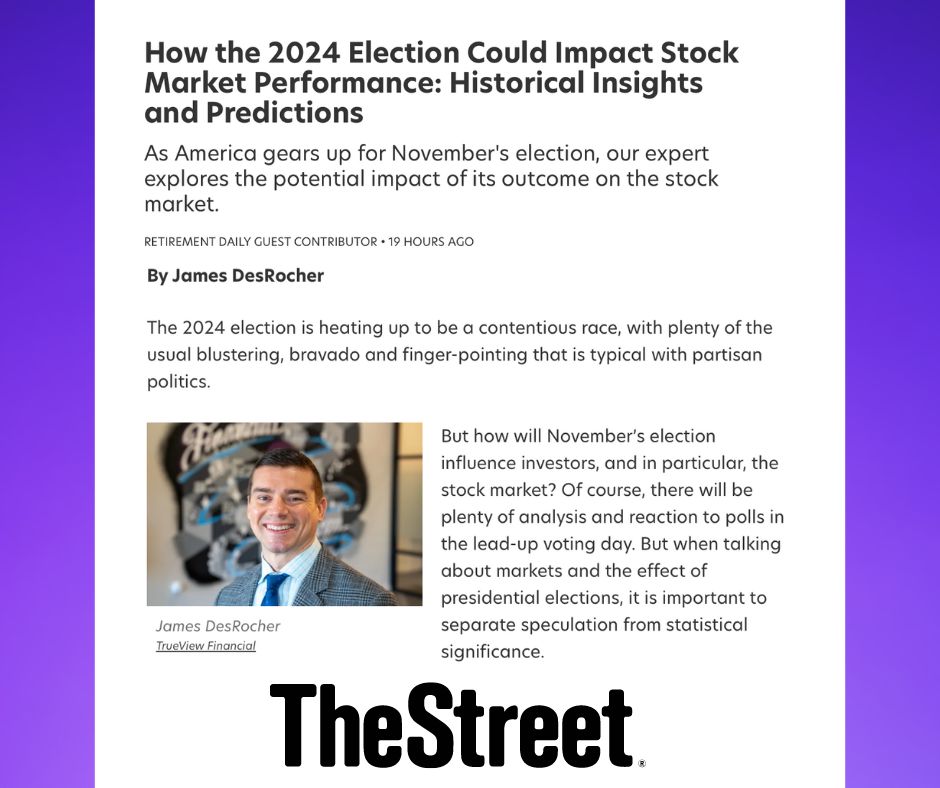
The 2024 election is heating up to be a contentious race, with plenty of the usual blustering, bravado, and finger-pointing that are typical with partisan politics.
But how will November’s election influence investors, and in particular the stock market? Of course, there will be plenty of analysis and reaction to polls in the lead up voting day. But when talking about markets and the effect of presidential elections, it’s important to separate speculation from statistical significance.
One thing we can bank on is that there’s no predicting what will happen next. However, we can study market data from the past 75 years to pinpoint a few trends and patterns that have occurred in capital markets during election cycles.
Looking at market data back to 1948, we can track average 3-month stock market returns (in the S&P 500) in the wake of each presidential election. Then, comparing those to the average returns during that same period in all years, strategists can pinpoint the effect of elections on market performance with statistical certainty (again; in the past, not necessarily the future).
(It’s also important to note that the data analysis starts when a new (or incumbent) President in sworn in and takes office, not from the time they win the election the November prior.)
While it would make for scintillating copy and click bait and to say that the market may swing wildly based on who resides next at 1600 Pennsylvania Avenue, the historical analysis paints a different portrait. In fact, in the medium to long run, the outcomes of presidential elections have made just a minimal impact on capital markets.
But we do see that markets may move a little slower in election years.
Since 1952, the S&P 500 has averaged only a 7% gain during U.S. presidential election years, compared to 16.8% in the year prior to an election year (and just shy of 10% average overall).
A study by T. Rowe Price with data from Bloomberg Finance L.P. found that from 1927 to 2023, the S&P 500 performed as follows:
- Presidential Election Years (24 observances): +11.0%
- Non-Presidential Election Years (72 observances): +11.6%
- All Years (96 observances): 11.5%
Of course, major economic developments in years that coincide with a presidential election my skew these numbers wildly, such as the Great Depression (1932), World War II (1940 and 1944), the tech bubble (2000), the Great Recession (2008), and, most recently, the COVID19 pandemic (2020).
When it comes to an election’s influence on capital markets, we also see less volatility during election cycles, which is somewhat surprising.
In fact, markets have been found to swing less wildly (both positive and negative) in the 12 months leading up to an election and a one-month period after.
Data points to other facets of the economy, such as inflation, being affected more closely by who is sworn in as our next Commander & Chief.
Down-ticket elections may be just (or even more) influential on the stock market than who is in the White House. In fact, there seems to be a greater level of disruption to capital markets if one party controls both the White House and Congress.
We do see a significant non-standard variance in the S&P 500 based on three distinct scenarios.
In both of these cases, we’ve seen positive absolute returns in the S&P 500 exceeding long-term averages:
- Democratic President and Republican control of the Congress.
- Democratic President and split party control of the House and Senate.
And one scenario has displayed S&P 500 returns were modestly below long-term averages:
- Republican President and Democratic control of the Congress.
Instead of looking at just election years and the effect on Wall Street, how about if we zoom out and look at the entire terms of sitting Presidents? Has there been a significant statistical difference in the S&P 500 between Democratic or Republican presidential leadership?
A study by Strategas Research Partners published by Fidelity looked at average annual S&P 500 performance from 1933 to 2022 (excluding 2001 to 2022 when a Senator moved across the aisle) and found that:
A Democratic President and:
- Democratic Congress +9.0%
- Divided Congress: +13.6%
- Republican Congress: + 13.0%
A Republican President and:
- Democratic Congress +4.9%
- Divided Congress: +13.7%
- Republican Congress: +12.9%
Markets seem to move more when the Oval Office and Congress are divided, not unified under one party, which may be some surprise.
Looking at the entirety of historical data around elections, we can surmise that markets are mostly non-partisan. With all of the talk of whether our next President will be red or blue, it seems that green is still the predominant color on Wall Street.
So, instead of overreacting or prognosticating, smart investors will stick to the fundamentals and a long-term plan no matter who is elected in November and sworn in next January.
– James DesRocher
Sources:
https://www.fidelity.com/learning-center/trading-investing/election-market-impact
https://money.usnews.com/investing/articles/election-2024-how-stocks-perform-in-election-years
***
Registered Representative and Financial Advisor of Park Avenue Securities LLC (PAS). OSJ: 800 Westchester Avenue, 4th Floor Suite N409, Rye Brook NY, 10573, 914-288-8800. Securities products and advisory services offered through PAS, member FINRA, SIPC. Financial Representative of The Guardian Life Insurance Company of America® (Guardian), New York, NY. PAS is a wholly owned subsidiary of Guardian. TrueView Financial LLC is not an affiliate or subsidiary of PAS or Guardian. #2024-178777 Exp: O7/2026
The opinions expressed are those of the author and not necessarily those of Guardian or its subsidiaries. This material is intended for general use. Past performance is not a guarantee of future results. Indices are unmanaged and one cannot invest directly in an index. All investments contain risk and may lose value.